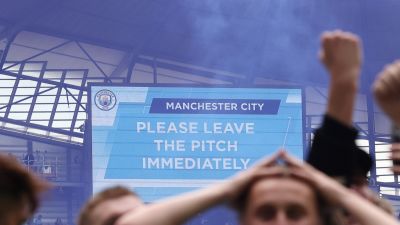Football banning orders in England and Wales up 230% on last season

Fans given football banning orders have risen by 230% in the first half of the current season with online abuse also up by more than half.
Police chiefs say the increase in orders being handed out is due to the "positive action" officers and the Crown Prosecution Service are taking to tackle the problems behind football disorder, which is still described as being at "worrying levels."
The figures released by the UK Football Policing Unit showed there were 343 banning orders issued across England and Wales between 1 July 2022 and 31 December 2022.
There were 999 football-related arrests in the period covered by the data, an 11% increase on the first half of 2021-22.
Reported incidents at matches were down 19% to 661, but that still represented the second-highest mid-season figure on record.
Incidents were reported at almost half of the 1,550 matches covered by the data.
Incidents involving supporter drug use increased by 42%.
From 10 November 2022, anyone convicted of either possessing or supplying Class A drugs at a regulated game could be made subject to a banning order.
Incidents featuring pyrotechnics increased slightly, while pitch invasions were down 39%
In 2022 a life-long Manchester City fan was given a three year ban for throwing a flare onto the pitch at their final game of the season against Aston Villa.
During the same game another City fan was also banned from attending matches for three years after invading the pitch and running towards Villa’s goalkeeper.
In July an Everton fan was given a three-year football ban after threatening and verbally abusing Newcastle United players at Goodison Park.
Robert Williams, approached the away team's exit and began shouting abuse.
Allegations of online hate have also risen by 53% compared to the same period in the previous season, with 29 incidents.
In 2021, Manchester United said it had seen a 350% increase in abuse towards its players online in the past 18 months, and the club joined many other clubs in a high profile social media blackout.
The National Police Chiefs’ Council’s football policing lead, Chief Constable Mark Roberts of Cheshire Police, said: "The first thing is that there have been more fans making themselves eligible for a banning order, and the second thing is that the police and the CPS have been a lot more focused on it.
"We’ve done a lot more post-match investigations, so as a consequence we’ve put (those individuals) before the courts.
"The next step in the chain is that the courts are now alive more than they were perhaps that there is an issue (with disorder).
"We still see some quite puzzling rulings by courts where banning orders aren’t issued."
Roberts is encouraged to see all parties concerned now recognising there is an issue with increased disorder post-Covid.
"I think when we highlighted the significant increase (in disorder) post-Covid, obviously everyone’s concerned, but I think you’ll probably remember there was a bit of commentary from some people about ‘well, it’s just a spike, the police are overhyping it’.
"I think we’ve got beyond that. The stats clearly demonstrate there is an elevated problem. It’s good that everyone’s on board with that, all the leagues, the FAs, the safety officers’ association.
"Everyone’s agreeing there is a problem, and once you’ve got that agreement you can actively start targeting it jointly.”